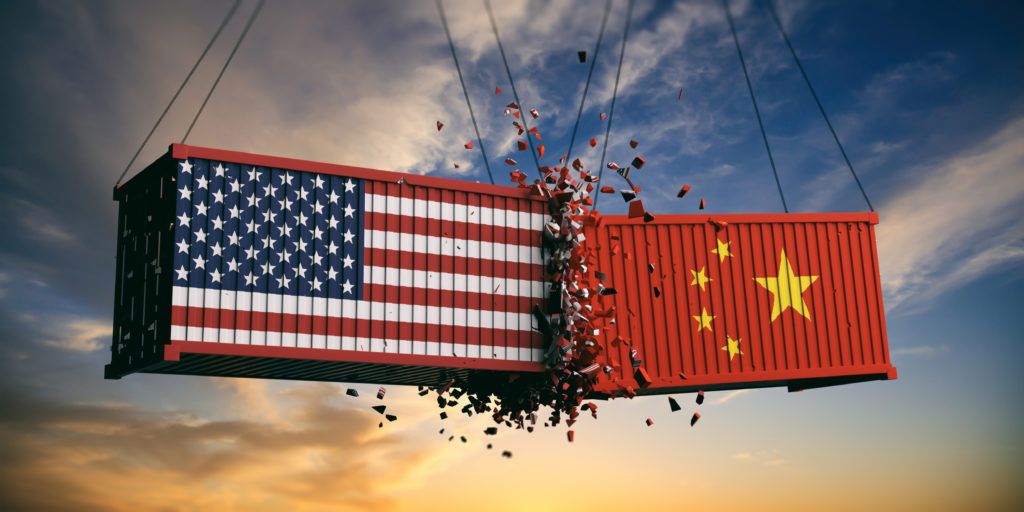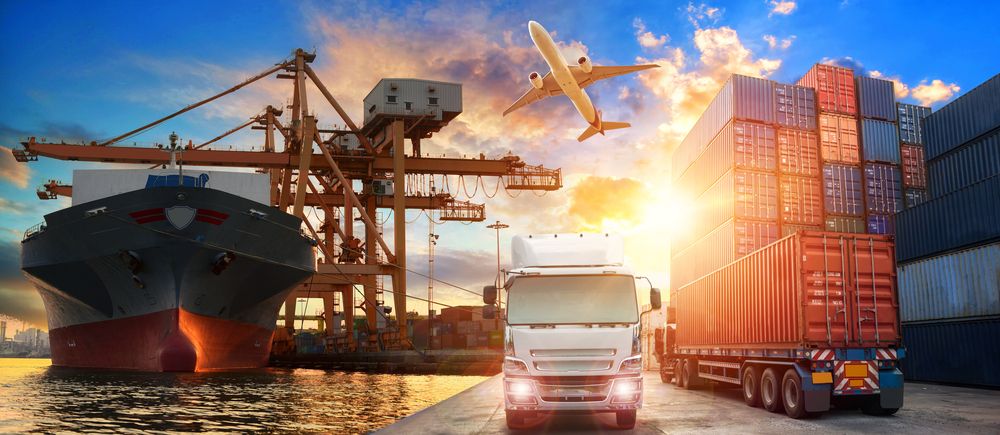Logistics are becoming incredibly complicated. Lately, it’s not just increasing complexity affecting the supply chain. Covid-19 is making the supply chain an utter wreck. However, there could be a blockchain solution.
Increasing complexity and pandemics aside, there are huge challenges that most supply chains need to overcome. Most importantly, there are pirates everywhere. This is especially true when shipping premium products into countries like China.
Take for example, wine. As the genuine Italian, French or Spanish vino hits Chinese shores, they can be snatched at one of the logistics transfer points. The containers are refilled with bottles of a cheap substitute that looks like the real deal. Studies have shown that a lot of these counterfeit wines don’t even have a single grape in them! They can be concoctions of artificial colorings, sugar and flavorings along with seriously worrying chemicals. The real bottles get sold on the black market.
If the real wines do make it to restaurant tables, the wine bottles can be snatched by the restaurant staff. They are refilled with a substitute, resealed and sold over and over again. Australian wine expert Jeremy Oliver once claimed that by the time that the average bottle of champagne that hits your restaurant table in China, it has been refilled 7 times or more.
The counterfeit problem
The same problem exists going the other way. When goods come out of developing countries and arrive at U.S. and European ports, they are plagued with counterfeits. Take medications, for example. These can be anything from fake diet pills, to fake erectile dysfunction pills. Even narcolepsy medicine has been found to be fake.
So how can buyers be sure they are getting the real deal? It is the logistics question of the moment.
There are other questions about the logistics chain. How can the bottlenecks at certain common points be defeated? How can outdated administration processes be updated? Some admin tasks are still manual and paper-based. These processes can de dogged by delays and human error. Shipments can go missing for a few days because they aren’t tracked electronically. This makes the task of giving delivery times a fortune-telling activity.
Blockchain technology is presenting a compelling solution for logistics challenges. Blockchain technology applied to logistics has seen a lot of hype. So, it is hard to know if uptake is genuine. Are blockchain solutions really just glorified databases?

Logistics and the blockchain
A PwC study shows that interest in a blockchain solution for logistics is growing. But so far, it hasn’t gained much traction. “Some commentators see vast potential for the technology to be applied within logistics functions. However, discussions about blockchain often fall into the trap of excessive hype by suggesting that it could be a solution for everything.”
When several separate companies are all working alongside each other, data from transactions between them is stored separately, and the data doesn’t produce an overall picture. Blockchain works in an opposite way: the network is automated, and all records are shared. This is why collaboration is difficult: trust issues. And yet, using a blockchain means that the ownership of the data is shared by everyone involved. To be a blockchain, every party in the network has all of the data. It is updated in real time for everyone at the same time. This creates a single source of the truth.
Tracing shipments via the blockchain
Robert Galarza is the CEO of TruTrace, a company that combines blockchain technologies with logistics. “In 2018, we really saw evolution in the industry – it went crazy. We are excited about what we’re seeing unfold in blockchain.”
TruTrace is a third-party logistics company that operates independently of the sender and the receiver. They are trying to convince manufacturers to use them to verify every part of the delivery journey. This can include verifying that the product is genuine.
Take medical marijuana, for example. Cannabis is a product which is very variable in nature. Galarza explains, “Our company built our system on the underlying engine of Orion One. Then we started building specific modules on top of it. These were focused on both details at a very granular batch level. We could serialize products down to the end user, and then we were able to really look at bringing blockchain into our infrastructure in terms of where and how would best fit. That’s how we started building traceability solutions.
“After that, we embarked to down the Ethereum route. But, unfortunately it didn’t work for us. The gas fees just didn’t do much for our business case. So, we ended up transitioning in 2018 to hyper ledger – The IBM Blockchain Platform. Recently, we started finding that it wasn’t performing at the level we need it to. Again, cost became an issue. So this year, we’ve really expanded our scope. One of the companies we’re most excited about is VeChain. The company has a really great solution from a blockchain infrastructure system.”
Improve supply chain management
VeChain is a blockchain platform. It has been designed to improve supply chain management and streamline business processes and information flow for complex supply chains. All of this is achieved using distributed ledger technology (DLT).
The Vechain platform uses VeChain Token (VET). This is to transfer value using the network. And the VeChainThor Energy (VTHO) is the energy or “gas” needed to power smart contract transactions.
Says Galarza, “We are looking at areas where a decentralized ledger can make sense in a business case for our clients. Ideally, we can build traceability into marketplace. There are big challenges that we’re dealing with in supply chain. Access to information, consistency and standardization of data and the ability for us to talk to one another. We call it interoperability.
“The logistics industry is incredibly complex. But also, you’re dealing with companies of all different types, sizes and ages, all around the world. And all those companies have their own home-based systems. They’re all running on different software; they manage their inventory in certain ways. They identify their products in certain ways. But what we find is that that disconnect, of real time information. With a barcode, you’re only getting data when it’s scanned in at different points along the supply chain. And there’s new innovative technologies such as IoT that can bring more real-time information into play.
“For example, a company may be shipping something that is sensitive to temperature changes, or humidity changes. We can put a sensor within a container that would speak to our software. It would know when light entered into a container. You could know the exact moment the goods were being accessed. It is here that we can stop the black-market operatives from putting counterfeit products into the supply chain.”
Combating counterfeits
Galarza says there is a massive problem with counterfeiting across the world at the moment, especially in the premium product segment. “When people receive agricultural products from places like Australia or Tasmania, or parts of Europe, like wine or whisky, things get tricky. The moment it hits the coast of China, there’s the danger that the black market will steal the items and replace them with products with a counterfeit label.
“We are also seeing issues around active pharmaceutical ingredients coming out of India and China. It might have the right pharmaceutical ingredient or the nutraceutical ingredient, but it’s at a potency level that is far less than what it should be. We’ve seen a myriad of different things whereby the consumer needs protection.
“Also, there is 15% breakage every year and that includes theft of inventory. That’s one area where we can start to build in a solution that can track and monitor those products in real time. It becomes part of the storyline of those products. You can see in your supply chain where there is a breakdown.”
Glorified database
Is the blockchain technology for logistics just a glorified database? Says Galarza, “That’s 100% accurate. But we are big believers that you don’t put everything on the blockchain. You can put the chain of custody data on there. It’s easily accessible by everybody in the ecosystem. Often, you don’t just trust everybody in the market. But with a system like this, the data can be secured.” Anybody who isn’t doing what they should be doing from an ethics perspective, is seen by the community at large.
“For us, the intriguing part about all this is what blockchain could become. We can build in traceability, then leverage the emerging digital currency space for those kinds of transactions at that level. We can build that into the smart contracting solution. All of a sudden, you’ve got contracts that are performance-based, and not promise-based. The execution of smart contracts is the future. There is a chain of custody handover. A product goes from A to B to B to C, C to D, and D is responsible for payment that will go up chain to A. The moment that that product gets handed over, that chain of custody converts. It could engage a smart contract to say, yes, transaction has gone from A to B, and the compensation associated with that is triggered.”
The digital currency advantage
Galarza says that where the business will really take off is around the use of digital currency. “We will be able to do business globally, with people in other countries. And I don’t have to worry about conversion rates. I don’t have to worry about exchange houses. I can just do it all through a digital medium. Cryptocurrency is still being treated as an asset class – it’s not for purchasing. Right now, it’s more of a commodity than it is anything else. But the future is bright.
“Giving complete and total transparency to your customers through an independent third-party system is what we are trying to do. Consumer trust is at an all-time low. A manufacturer might be doing all the right things – manufacturing a great product, organic, certified and non-GMO, getting it tested and doing certifications. But how can the customer be sure that’s what arrives at their door? So we can serve as that independent third party system where the verification of this product was secured. So that product verification layer is where we live so that it’s not coming from the manufacturer. We want to help good actors.
“The blockchain stuff and IoT is all super exciting. We’re thrilled to be working with these really new innovative technologies.”
This all sounds good in theory. But in practice, can competing logistics companies work together on the blockchain to increase efficiency and security for all involved? Again, we better watch this space!
Do you think that the logistics crisis can be solved using blockchain? Tell us here.
Disclaimer
Following the Trust Project guidelines, this feature article presents opinions and perspectives from industry experts or individuals. BeInCrypto is dedicated to transparent reporting, but the views expressed in this article do not necessarily reflect those of BeInCrypto or its staff. Readers should verify information independently and consult with a professional before making decisions based on this content. Please note that our Terms and Conditions, Privacy Policy, and Disclaimers have been updated.

